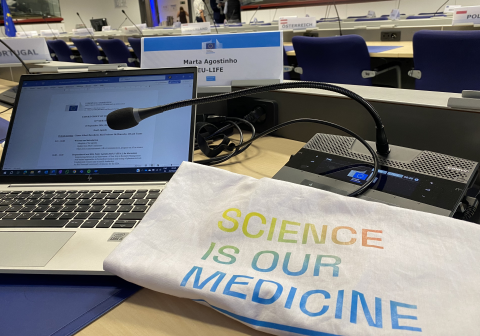Envisioning the future of research management careers
Professionals in the interface of science, including specialists in project management, governance, knowledge transfer, science policy and science communication, are essential for the research ecosystem. However, the role and contribution of this collective, also known as research managers, has been traditionally disregarded by funders, policymakers and the research & innovation ecosystem as a whole.
EU-LIFE advocates for scientific research in policy settings and works to provide researchers and research managers with the best environment possible. The backbone of EU-LIFE is its community of practice, structured in working groups and mostly composed of research managers. It forms an active network of c. 150 people from 15 institutes across Europe, which provides its members with a wide and inspiring peer-to-peer group and with a platform to build capacity within their institutions.
The work of EU-LIFE and other organisations on the recognition of research management as a critical part of the research & innovation ecosystem has led up to the co-creation of Action 17 of Research Management of the European Research Area (ERA). This policy initiative has the goal to promote activities towards the recognition of the profession and the creation of a career framework, and is boosted by the launch of European projects devoted to support and envision the future of research management, like CARDEA and RM Roadmap, in which Marta Agostinho, EU-LIFE Executive Director, is involved as a member of the RM Roadmap Advisory Board.
In this context, and in collaboration with the Marie Curie Alumni Association (MCAA), we launch today a report about the role of project managers in collaborative Marie Skłodowska-Curie Actions (MSCA) projects, which includes a set of actionable strategies to support their activity around three recommendations:
- For the European Commission, to establish well-defined career paths for project managers and promote conditions to maximise and retain talent
- For research institutions, to promote a cultural shift within institutions that acknowledges the added value of project managers
- For individuals, to maximise networking opportunities and advocate for a recognition of the project manager role
This report is based on the discussions held during a workshop run by EU-LIFE and the MCAA Research Management Working Group (RM WG) to assess the evolving role of project managers in MSCA. The event was co-located with the MSCA Presidency Conference 2023, organised by the European Commission and the Spanish Presidency of the Council of the EU in November 2023.
“Seeing researchers, project managers, the European Commission, and National Contact Points collaborate at the World Café Workshop was truly inspiring,” said Jonas Krebs, Coordinator of the Strategic Projects Area at CRG and co-founder of the MCAA RM WG. “The discussions emphasized the crucial role of project managers and the need for better support and training to ensure the success of MSCA projects.”
Jonas recently gave EU-LIFE an interview about the role of research managers in science, which is accessible here.
This collaboration was facilitated by Iris Uribesalgo, EU-LIFE Policy Officer and member of the MCAA RM WG since its creation, who was heavily involved in the drafting of the report.
“In this report we share the collective wisdom of the workshop’s participants for the benefit of the research & innovation ecosystem,” said Iris. “We hope it will contribute to professionalising the vital role of project managers in MSCA projects.”
The report 'Insights and recommendations on the role of Project Managers in collaborative MSCA projects' is available in this link: https://zenodo.org/records/13692969



